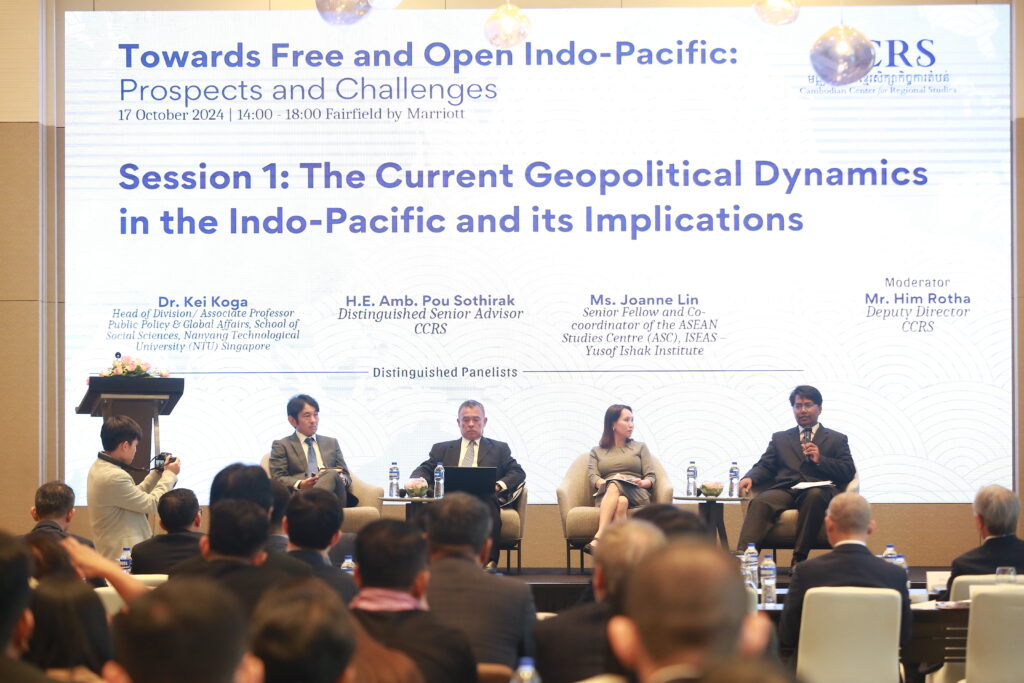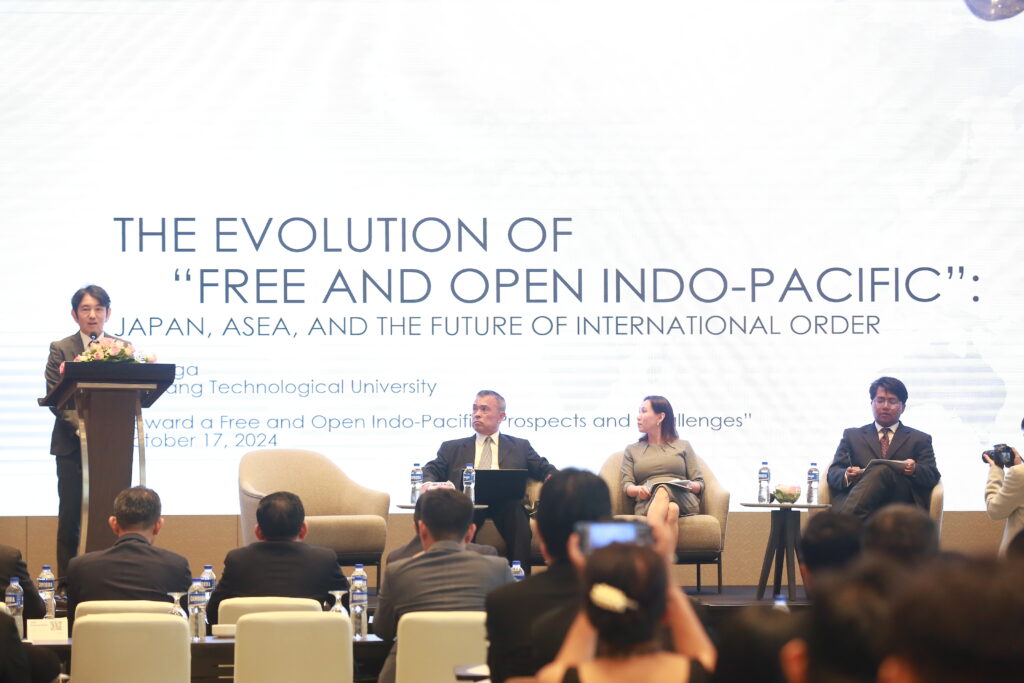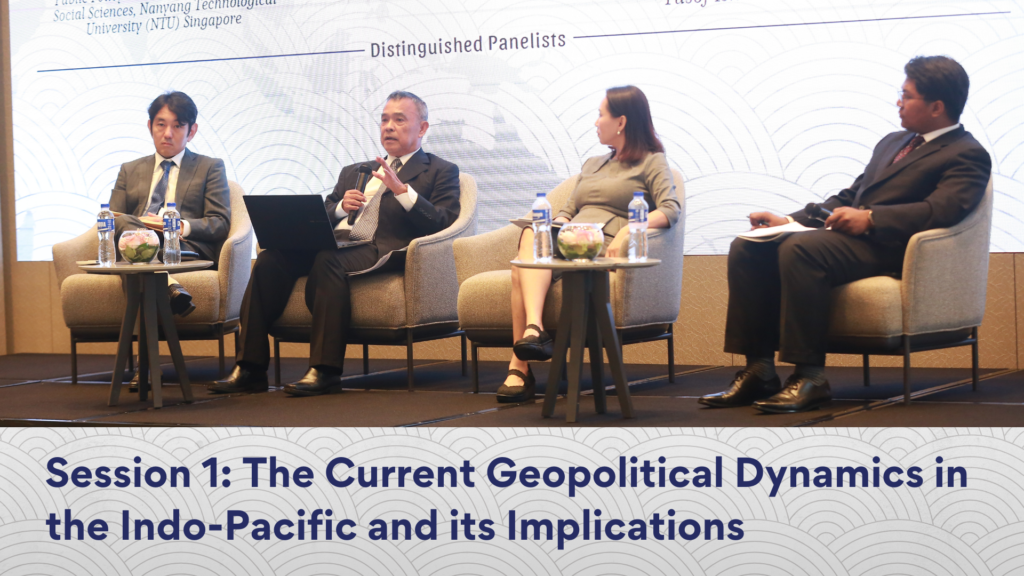
CCRS organized a regional seminar on “Towards Free and Open Indo-Pacific: Prospects and Challenges” on 17 October 2024. In the first session, there was a panel discussion on the current geopolitical dynamics in the Indo-Pacific and its implications.
The strategic environments in the Indo-Pacific have been increasingly volatile and worrisome due to the intensification of US-China rivalry and other potential flashpoints. Navigation of the great power competition and tampering other security crisis have become a top priority for many small and middle powers globally and regionally. In this session, speakers and participants share their perspectives on the ongoing strategic developments and changing regional dynamics in the Indo-Pacific and explore ways to strengthen rule-based order by addressing key questions such as: what are key characteristics of the ongoing geopolitical developments in the Indo-Pacific? What are the primary drivers behind these developments and the resultant implications for the evolving strategic dynamics in this region? How can geopolitical rivalry between the US and China be meddled? How should ASEAN and other middle powers respond to these challenges? What options do ASEAN and Japan explore in maintaining an international liberal system?
In this session, there three eminent and experienced speakers taking part:
- Dr. Kei Koga, Head of Division/Associate Professor at the Public Policy and Global Affairs Programme, School of Social Sciences, Nanyang Technological University (NTU)
- H.E. Amb. Pou Sothirak, Distinguished Senior Advisor, CCRS
- Ms. Joanne Lin, Senior Fellow and Co-coordinator of the ASEAN Studies Centre (ASC), ISEAS – Yusof Ishak Institute
The session was moderated by Mr. Him Rotha, Deputy Director of CCRS.
Synopses of Presentations by Distinguished Speakers
The Evolution of “Free and Open Indo-Pacific”: Japan, ASEAN, and the Future of International Order
Dr. Kei Koga, Head of Division/ Associate Professor at the Public Policy and Global Affairs Programme, School of Social Sciences, Nanyang Technological University (NTU)
In his talk, Dr. Koga examines the evolution of “Free and Open Indo-Pacific.” He will begin by exploring key characteristics and drivers of the geopolitical dynamics in the Indo-Pacific. He argues that the key driver of the strategic environment in the Indo-Pacific has been the US-China strategic competition since 2010s. Then, he examined the evolution of Japan’s Free and Open Indo-Pacific and how Japan managed to synergize its vision with ASEAN. In his last part, Dr. Koga laid out the future of FOIP and strategic options for ASEAN and Japan. He suggested that while there is no simple solution to this, both should strive toward creating a new institutional architecture in the Indo-Pacific.

Rules-Based Order Amidst US-China Rivalry: Roles of ASEAN and Japan
H.E. Amb. Pou Sothirak, Distinguished Senior Advisor, CCRS
Amb. Pou Sothirak will provide a brief overall diagnostic analysis on the complexity involving the changing geopolitical environment of the Indo-Pacific region, where the geostrategic interest of both the US and China and their relentless rivalry affect Southeast Asia as a whole. He will also discuss what roles ASEAN and Japan can proactively promote the rules-based order.
The Current Geopolitical Dynamics in the Indo-Pacific and its Implications for ASEAN-Japan Relations
Ms. Joanne Lin, Senior Fellow and Co-Coordinator, ASEAN Studies Centre, ISEAS – Yusof Ishak Institute
The presentation has two parts, namely (1) the current geopolitical dynamics in the Indo-Pacific; and (2) implications for ASEAN-Japan relations. The current geopolitical dynamics in the Indo-Pacific are presenting a multitude of challenges for both ASEAN and Japan as they navigate the region’s rapidly shifting power structures. The intensifying rivalry between the United States and China, growing militarisation, and increasing economic competition, compounded by the involvement of secondary actors such as Russia and North Korea, have transformed the Indo-Pacific into a complex and highly contested arena. For ASEAN and Japan, these developments pose risks to regional security, economic stability, and their ability to maintain strategic autonomy in a more polarised world. As the current geopolitical dynamics in the Indo-Pacific pose significant challenges for ASEAN and Japan, both sides will need to navigate an increasingly complex environment carefully. For ASEAN, the challenge is maintaining centrality and cohesion in the face of external pressures, while Japan seeks to strengthen its security posture without worsening regional tensions. As the Indo-Pacific continues to evolve, ASEAN and Japan ability to adapt and collaborate will be crucial for ensuring the regional peace and stability.
Short Biographies of Distinguished Speakers
H.E. Amb. Pou Sothirak
Distinguished Senior Advisor, CCRS
Ambassador Pou Sothirak is a retired academic currently serving as the Distinguished Senior Advisor to the Cambodian Center for Regional Studies (CCRS). He was the Executive Director of the Cambodian Institute for Cooperation and Peace from May 2013 to August 2023. He was appointed as Secretary of State of the Ministry of Foreign Affairs and International Cooperation of Cambodia from September 2013 to January 2014. He was a Visiting Senior Research Fellow at the Institute of the Southeast Asian Studies (ISEAS) in Singapore from January 2009 to December 2012. He also served as Cambodian Ambassador to Japan from April 2005 to November 2008. He was elected Cambodian Member of Parliaments twice during the national general election in 1993 and 2003. He was appointed as Minister of Industry Mines and Energy of the Royal Government of Cambodia from 1993 to 1998. He has written extensively on various issues concerning the development of Cambodia and the region.
Dr. Kei Koga
Head of Division/ Associate Professor at the Public Policy and Global Affairs Programme, School of Social Sciences, Nanyang Technological University (NTU)
Kei Koga is Head of Division/ Associate Professor at the Public Policy and Global Affairs Programme, School of Social Sciences, Nanyang Technological University (NTU). Concurrently, he is a Nonresident Fellow at The National Bureau of Asia Research (NBR), the United States, and a member of RIPS Research Committee, the Research Institute for Peace and Security (RIPS), Japan. His research focuses on International Security, International/Regional Institutions (particularly ASEAN), and East Asian/Indo-Pacific security. For more details, visit https://www.keikoga.com/
Ms. Joanne Lin
Senior Fellow and Co-Coordinator,
ASEAN Studies Centre,ISEAS – Yusof Ishak Institute
Ms. Joanne Lin is the Senior Fellow and Co-Coordinator of the ASEAN Studies Centre, ISEAS – Yusof Ishak Institute in Singapore. She has over 15 years of work experience in the Singapore public sector, regional and international organisations, think tanks, and NGOs. She has previously served at the ASEAN Secretariat from 2015 to 2021 and was the Head of the External Relations Division under the ASEAN Political-Security Community Department. Her research includes ASEAN institutions, external relations, and political-security developments in ASEAN.

